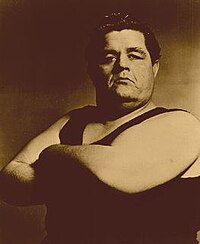Two Tons Of Comedy
Author Unknown, Charlotte News 1965
 |
| WIKIPEDIA |
Two Ton Harris, who doesn't really weigh two tons but a mere 301, is one of the most delightful characters Promoter Jim Crockett has brought into his wrestling ring here in recent years. Although wrestling in a preliminary, Two Ton stole much of the show last night at the coliseum.
After a particularly shrewd act of villainy, he winks at the crowd and points to his head. When his opponents grow a mite too unhappy with his tactics, Two Ton drops to his knees, clasps his hands and pleads for mercy.
Given a moment of free time, he parades his round, black-clad frame around the ring, caresses his long, curly locks and poses smilingly for the fans to enjoy him.
When the crowd squeals on him to the referee, he runs around the ring trying to shush them. Two Ton has a better routine than most of the comics I've seen on TV.
- Charlotte News, January 12, 1965
* * * * * * * * * * * *
PERSPECTIVE: JANUARY 1965
by Dick Bourne
Mid-Atlantic Gateway
The short piece above appeared in the Charlotte News the day after a 1/11/65 Charlotte Park Center card where Two Ton Harris worked the opener against Abe Jacobs. it brought a smile to my face when Mark Eastridge sent me the clipping because Two Ton Harris was always a favorite of mine as a kid .... "I got him now!"
by Dick Bourne
Mid-Atlantic Gateway
The short piece above appeared in the Charlotte News the day after a 1/11/65 Charlotte Park Center card where Two Ton Harris worked the opener against Abe Jacobs. it brought a smile to my face when Mark Eastridge sent me the clipping because Two Ton Harris was always a favorite of mine as a kid .... "I got him now!"
The other preliminary matches on the card included Johnny Weaver vs. The Beast, Penny Banner vs. Kim Stratton, and tag match featuring Mike Gallagher and Lee Henning vs. Chief Big Heart and Rudy Kay.
The main event was a big six-man fence match with no time limit and no disqualifications. It pitted Aldo Bogni and Bronko Lubich with their manager Homer O'Dell as their partner against George Becker and The Kentuckians (Tiny Anderson and Big Boy Brown.)
The ad touted the main event match as one surrounded by a "7-foot steel wire fence." This was long before we started calling them "cage matches" and I liked it better when they were called fence matches because it made the purpose of the enclosure clearer.
A "cage" tends to signify that you want to keep the combatants caged in. But the general purpose of these fence matches was to keep other people out; to prevent interference from other parties. It also kept any of the combatants from escaping, sure, but it primarily insured that the match would be settled between the combatants inside the wire fence with no one else able to interfere. (Other stipulation-matches like lumberjack matches worked better to keep guys from running, and were more exciting than a fence match, anyway.)
I also liked how the promotion always plugged the company who provided the fencing, which was a barter arrangement to be sure. In this case, thanks go to the fine folks at Charlotte Fence Builders, a company founded in 1958 by Charlotte businessman Jim McClain, and still in business today.
As always in Charlotte, advance tickets were available at the National Hat Shop. In 1965, ticket prices were a steep $1.50 for adult general admission, $2.00 reserved, and $2.50 reserved ringside. Tickets for children under 12 we just 75 cents.
I also liked how the promotion always plugged the company who provided the fencing, which was a barter arrangement to be sure. In this case, thanks go to the fine folks at Charlotte Fence Builders, a company founded in 1958 by Charlotte businessman Jim McClain, and still in business today.
As always in Charlotte, advance tickets were available at the National Hat Shop. In 1965, ticket prices were a steep $1.50 for adult general admission, $2.00 reserved, and $2.50 reserved ringside. Tickets for children under 12 we just 75 cents.